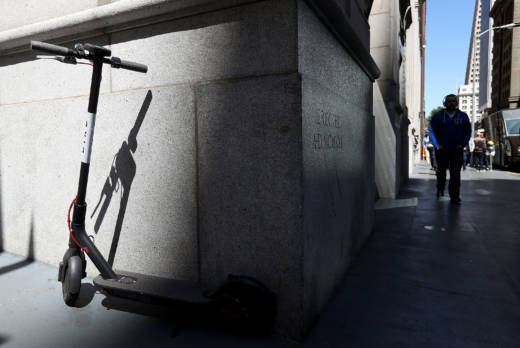One of them — Lime — said it plans to appeal the SFMTA’s decision.
The SFMTA said it scored the dozen scooter applicants on 12 categories, including their plans to educate customers on safe riding, proposals for outreach to low-income residents and approach to sustainability in operating and disposing of their scooter fleets.
The agency hopes to use data from the scooter pilot to determine how the vehicles fit into the overall scheme of San Francisco’s transportation network.
The SFMTA said Scoot and Skip provided the strongest proposals, demonstrating “not only a commitment to meet the terms of the permit, but a high level of capability to operating a safe, equitable and accountable scooter share service.”
Under the pilot program’s rules, companies denied permits can appeal the agency’s decision — an option that Lime said it planned to exercise.
“San Franciscans deserve an equitable and transparent process when it comes to transportation and mobility,” Lime CEO Toby Sun said in a statement. “Instead, the SFMTA has selected inexperienced scooter operators that plan to learn on the job, at the expense of the public good.”
Lime was also shut out of the city’s dockless bike share program — a competition won by Jump, which was allowed in January to place 250 electric-assist bicycles on city streets.
“The SFMTA’s handling of the dockless bike and scooter share programs has lacked transparency from the beginning,” Sun said in his statement. “We call on the mayor’s office and Board of Supervisors to hold the SFMTA accountable for a flawed permitting process.”
Bird and Spin issued statements after the permit announcement expressing disappointment — but mentioned no plans to appeal.
Southern California-based Bird said it would work with the city and community to bring its scooters back to the city after the pilot. Spin said it hopes that the city will allow an expansion of the pilot program that would allow it to participate.
The companies won an apparently wide and enthusiastic following as they placed thousands of their mini-vehicles on the streets beginning in late March.
But they were criticized for distributing the scooters without city permission and were blamed for widespread scofflaw behavior on the part of customers, many of whom rode on sidewalks, failed to wear helmets and dumped the scooters in the public right-of-way when they were finished riding.
San Francisco Public Works crews began seizing haphazardly parked scooters — eventually impounding 374 of the vehicles. The SFMTA says the companies paid $45,510.26 in all to retrieve them.
The Board of Supervisors passed an ordinance in late April that directed the SFMTA to create a permitting process for scooter operations, and the agency began taking applications at the end of May.
The deadline for applications was June 7 — the same date that Bird, Lime and Spin were ordered to remove their machines from city streets pending grant of the pilot permits.

